
Winter...you either love it or hate it.
Sure, you may have once been OK with weekly snowfall and below-freezing temperatures, but as you've aged, those aspects of winter have become more burdensome than enjoyable. From cleaning off the car after heavy snowfall to shoveling your driveway, winter maintenance adds up.
If you currently reside in a state where winter routinely makes a name for itself, you may find it appealing to spend a few months in someplace warm.
Why?
Retired individuals and couples have a lot of time on their hands, but snow and cold place a limit on what can be done throughout the day. After all, no one really likes spending more than five minutes outside when temperatures are in the single digits.
By spending the winter somewhere warm, you'll be able to officially call yourself a snowbird. Instead of dealing with cold, you'll be able to head outside wearing shorts and a shirt. That's quite the trade off.
But before you pack your bags, there are some financial considerations you need to make.
When will you go?
Generally speaking, winter starts Dec. 1 and ends somewhere around the middle of March. But leaving right after Thanksgiving can present challenges because of the December holidays.
Then you have to factor in your return. While winter may end in March, it's not unusual for many areas to still experience lingering effects at the end of the month and even into the beginning of April.
You have to carefully consider the amount of time you'll be gone. If you're looking to make things easier on your family and friends, you may want to leave after the holidays. This will allow you to enjoy everything the holidays have to offer while still leaving town before the heart of winter arrives.
Additionally, having firm dates will allow you to take care of any monthly bills ahead of time. Contact your utility and cable/internet providers about paying ahead. You'll also be able to find someone to collect your mail and check up on your home while you are basking in the sun.
Where will you stay?
Becoming a snowbird opens up plenty of options when it comes to destinations. You can stay in the U.S. and head to popular winter getaway locations such as Phoenix or just about anywhere in Florida. Or, you may even consider heading down to Mexico.
Wherever you end up going, you'll need some form of housing. Assuming you stay for at least three months, finding an apartment or condo to rent is your best bet. And if in a few years you enjoy the snowbird life, you can buy a second home.
U.S. News & World Report recommended that you always rent first instead purchasing [1]. You first want to make sure you enjoy spending a handful of months away from your primary home. If you buy first, you run the risk of not enjoying the experience and therefore having an empty home for the majority of the year.
But if you buy after renting, you'll be able to rent out the home for the months when you aren't there, if that's something you might find appealing. Remember, when you buy a second home, someone needs to maintain it when you will not be living there. So not only will you take on a second mortgage, but also maintenance fees. Even though you're retired, you still have to watch your spending.
There will be additional costs
Whether you rent or buy, you want to financially prepare for the added costs. How much those bills are will depend on where you reside. According to Time Money, homes in Florida typically need to have the air condition running year-round to avoid mold growth, and that will equate to a high electricity bill [2].
"Whether you rent or buy, you want to financially prepare for the added costs."
The best way to get a firm grasp on your new financial situation is to create a thorough budget. Map out the costs you'll have at your primary and secondary residence, even if you'll be renting. Remember, you can't just turn off the heat at your primary home, so you'll need to factor in monthly utilities, especially if your children will be staying behind at your home.
Entertainment, food, and travel are all additional expenses that must be accounted for beforehand. There will likely be some surprises, so make sure to set aside some money for those situations as well.
You'll also want to alert your primary bank provider of your plans so they don't get suspicious when they see transactions being made hundreds of miles away from your primary residence.
Why you should spend time away from home
From the warmer weather to living in a new place, there are numerous reasons why you might find the idea of becoming a snowbird appealing. You never know, you may enjoy it so much that you may even consider a permanent move to a new location.
But above all, you need to carefully plan for the three or more months you'll be spending someplace warm.
Sources:
[1]. 5 Finance Tips for Future Snowbirds
[2]. Do These 3 Things Before You Head South for the Winter